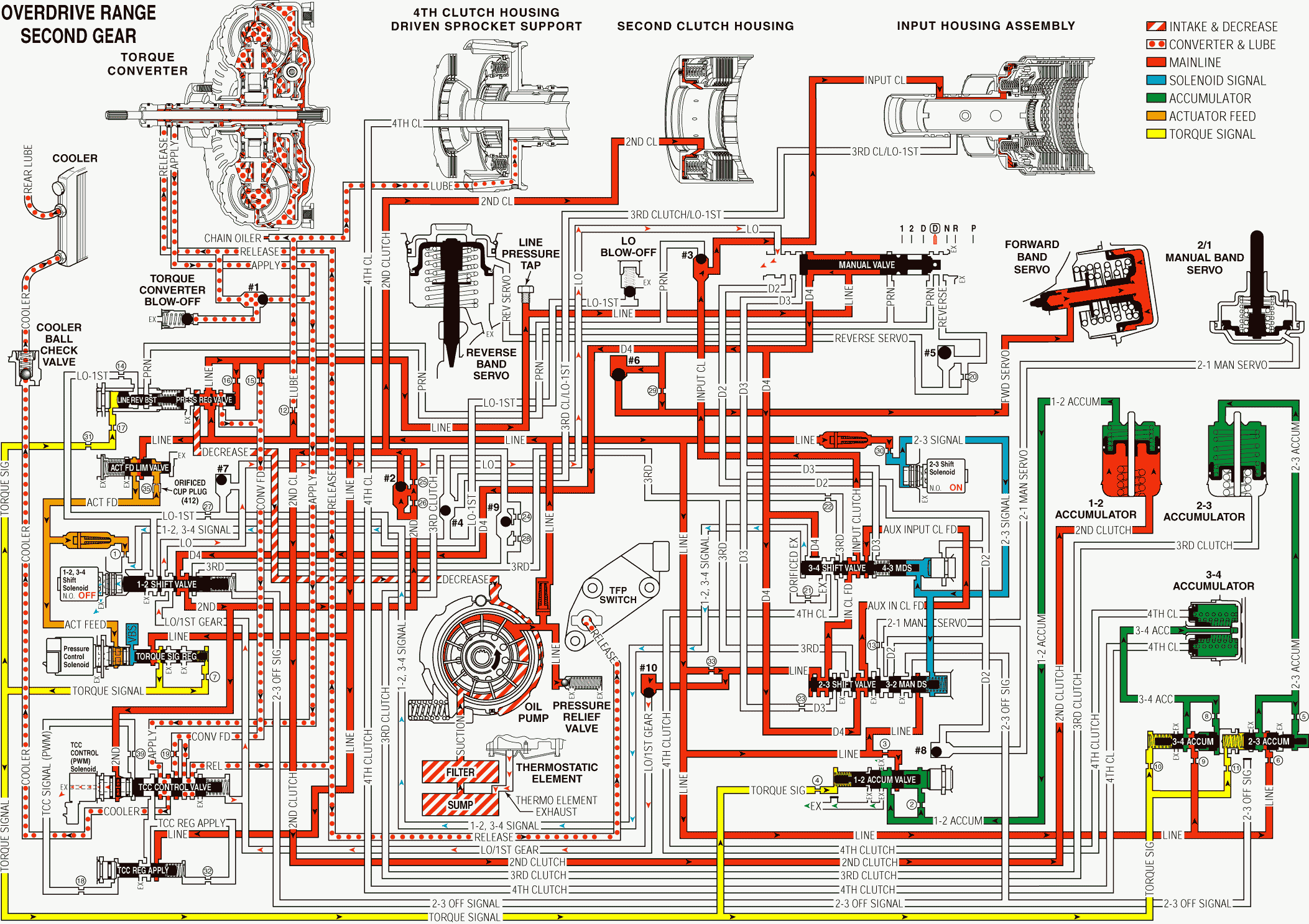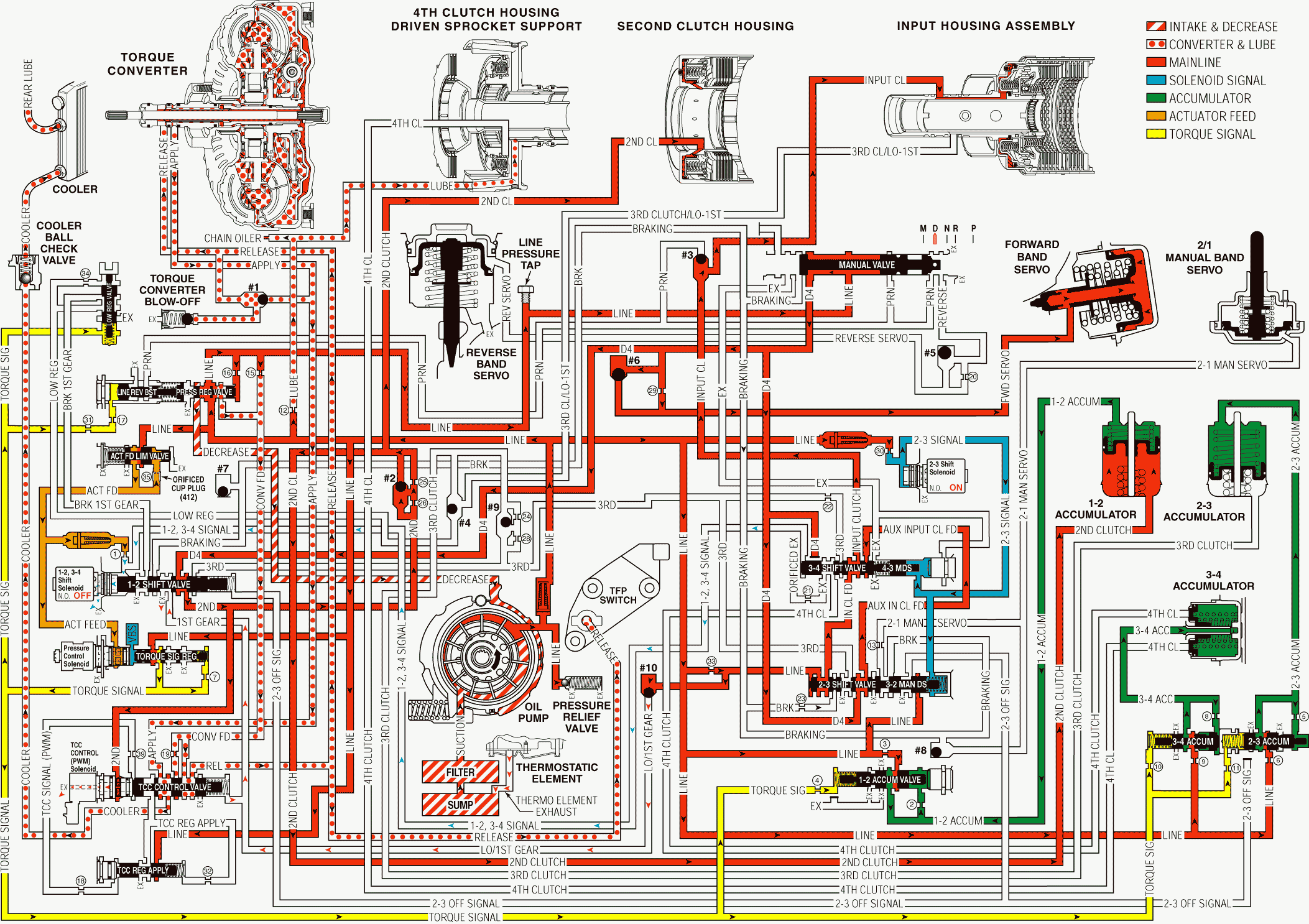Overdrive Range, Second Gear Without Touch Activated Power
As the speed of the vehicle increases, the powertrain control module (PCM) receives input signals from various engine and transmission sensors. The PCM uses this data to de-energize 1-2, 3-4 shift solenoid valve in order to shift the transmission into second gear at the appropriate time.
1-2, 3-4 Shift Solenoid (SS) Valve (315A)
De-energized (OFF) by the PCM, it exhausts 1-2, 3-4 signal fluid through the solenoid thereby creating a low 1-2, 3-4 signal fluid pressure in the circuit. Low 1-2, 3-4 signal fluid pressure allows the 1-2 shift valve to move to the upshifted position.
1-2 Shift Valve (318)
With the 1-2, 3-4 SS valve OFF, spring pressure moves the valve allowing D4 pressure to enter the 2nd fluid passage directing 2nd fluid to the Number 2 ball check valve.
Number 2 Ball Check Valve (372)
Located in the case cover (400), 2nd fluid seats the ball check valve and is forced through an orifice into the 2nd clutch passage to apply the 2nd clutch.
Second Clutch
2nd clutch fluid pressure applies the Second clutch to shift the transmission into Overdrive Range - Second gear.
Input Clutch
Remains applied, but is now ineffective.
Input Sprag Clutch
Overruns as the second clutch applies.
Forward Band
Remains applied.
1-2 Support Roller Clutch
Continues to hold while the forward band is applied.
1-2 Accumulator
2nd clutch fluid is also routed to the 1-2 accumulator piston. 2nd Clutch fluid pressure, in addition to 1-2 assist spring force, moves the piston against spring force and 1-2 accumulator feed fluid pressure. This action absorbs initial 2nd clutch fluid pressure to cushion the second clutch apply. The movement of the 1-2 accumulator piston forces some accumulator fluid out of the accumulator.
1-2 Accumulator Valve
1-2 accumulator feed fluid forced from the 1-2 accumulator is routed back to the 1-2 accumulator valve. This pressure forces the 1-2 accumulator valve against spring force and the torque signal fluid pressure to regulate the exhaust of excess accumulator fluid. This regulation provides additional control for the second clutch apply.
TCC Control Pulse Width Modulated (PWM) Solenoid Valve
2nd fluid is routed to the TCC control PWM solenoid. Under normal operating conditions the TCC control PWM solenoid is OFF in Second gear and blocks 2nd fluid from entering the TCC signal fluid circuit.
Torque Converter Clutch
With the TCC control PWM solenoid OFF the converter clutch is released in Second gear. Under normal operating conditions the TCC is released in Second gear. However, TCC apply could vary depending on vehicle application and may be calibrated to apply in Overdrive Range -- Second Gear.
Transmission Fluid Pressure (TFP) Manual Valve Position Switch
Release fluid pressure routed to the TFP manual valve position switch signals the PCM that the TCC is released.
Overdrive Range, Second Gear - Without Touch Activated Power

Overdrive Range, Second Gear With Touch Activated Power
As the speed of the vehicle increases, the powertrain control module (PCM) receives input signals from various engine and transmission sensors. The PCM uses this data to de-energize 1-2, 3-4 shift solenoid valve in order to shift the transmission into second gear at the appropriate time.
1-2, 3-4 Shift Solenoid (SS) Valve (315A)
De-energized (OFF) by the PCM, it exhausts 1-2, 3-4 signal fluid through the solenoid thereby creating a low 1-2, 3-4 signal fluid pressure in the circuit. Low 1-2, 3-4 signal fluid pressure allows the 1-2 shift valve to move to the upshifted position.
1-2 Shift Valve (318)
With the 1-2, 3-4 SS valve OFF, spring pressure moves the valve allowing D4 pressure to enter the 2nd fluid passage directing 2nd fluid to the Number 2 ball check valve.
Number 2 Ball Check Valve (372)
Located in the case cover (400), 2nd fluid seats the ball check valve and is forced through an orifice into the 2nd clutch passage to apply the 2nd clutch.
Second Clutch
2nd clutch fluid pressure applies the Second clutch to shift the transmission into Overdrive Range - Second gear.
Input Clutch
Remains applied, but is now ineffective.
Input Sprag Clutch
Overruns as the second clutch applies.
Forward Band
Remains applied.
1-2 Support Roller Clutch
Continues to hold while the forward band is applied.
1-2 Accumulator
2nd clutch fluid is also routed to the 1-2 accumulator piston. 2nd Clutch fluid pressure, in addition to 1-2 assist spring force, moves the piston against spring force and 1-2 accumulator feed fluid pressure. This action absorbs initial 2nd clutch fluid pressure to cushion the second clutch apply. The movement of the 1-2 accumulator piston forces some accumulator fluid out of the accumulator.
1-2 Accumulator Valve
1-2 accumulator feed fluid forced from the 1-2 accumulator is routed back to the 1-2 accumulator valve. This pressure forces the 1-2 accumulator valve against spring force and the torque signal fluid pressure to regulate the exhaust of excess accumulator fluid. This regulation provides additional control for the second clutch apply.
TCC Control Pulse Width Modulated (PWM) Solenoid Valve
2nd fluid is routed to the TCC control PWM solenoid. Under normal operating conditions the TCC control PWM solenoid is OFF in Second gear and blocks 2nd fluid from entering the TCC signal fluid circuit.
Torque Converter Clutch
With the TCC control PWM solenoid OFF the converter clutch is released in Second gear. Under normal operating conditions the TCC is released in Second gear. However, TCC apply could vary depending on vehicle application and may be calibrated to apply in Overdrive Range -- Second Gear.
Transmission Fluid Pressure (TFP) Manual Valve Position Switch
Release fluid pressure routed to the TFP manual valve position switch signals the PCM that the TCC is released.
Overdrive Range, Second Gear - With Touch Activated Power

